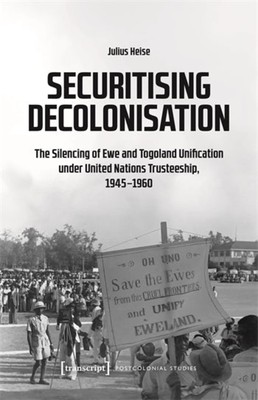
- We will send in 10–14 business days.
- Author: Julius Heise
- Publisher: Transcript Publishing
- ISBN-10: 3837673065
- ISBN-13: 9783837673067
- Format: 17 x 24.4 x 2.2 cm, minkšti viršeliai
- Language: English
- SAVE -10% with code: EXTRA
Reviews
Description
With the right to petition the United Nations, the Ewe and Togoland unification movement enjoyed a privilege unmatched by other dependent peoples. Using language conveying insecurity, the movement seized the international spotlight, ensuring that the topic of unification dominated the UN Trusteeship System for over a decade. Yet, its vociferous securitisations fell silent due to colonial distortion, leaving unification unfulfilled, thus allowing the seeds of secessionist conflict to grow. At the intersection of postcolonial theory and security studies, Julius Heise presents a theory-driven history of Togoland's path to independence, offering a crucial lesson for international statebuilding efforts.
EXTRA 10 % discount with code: EXTRA
The promotion ends in 22d.06:20:01
The discount code is valid when purchasing from 10 €. Discounts do not stack.
- Author: Julius Heise
- Publisher: Transcript Publishing
- ISBN-10: 3837673065
- ISBN-13: 9783837673067
- Format: 17 x 24.4 x 2.2 cm, minkšti viršeliai
- Language: English English
With the right to petition the United Nations, the Ewe and Togoland unification movement enjoyed a privilege unmatched by other dependent peoples. Using language conveying insecurity, the movement seized the international spotlight, ensuring that the topic of unification dominated the UN Trusteeship System for over a decade. Yet, its vociferous securitisations fell silent due to colonial distortion, leaving unification unfulfilled, thus allowing the seeds of secessionist conflict to grow. At the intersection of postcolonial theory and security studies, Julius Heise presents a theory-driven history of Togoland's path to independence, offering a crucial lesson for international statebuilding efforts.


Reviews